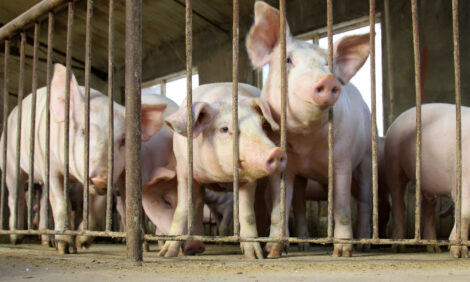



Brexit: Governments Must Work with Industry on Future of Farming
UK - The UK has voted and the decision is to leave the EU. It is now greatly important that an early commitment is made to British farming.The National Farmers' Union (NFU) President Meurig Raymond said that the organisation would campaign for the best possible access to markets in the EU and further afield, whilst ensuring that the UK is protected from imports that are produced to lower standards.
Mr Raymond said: “The vote to leave the European Union will inevitably lead to a period of uncertainty in a number of areas that are of vital importance to Britain’s farmers.
“The NFU will engage fully and constructively with the British government to construct new arrangements. This needs to happen as soon as possible.
“We understand that the negotiations will take some time to deliver but it is vital that there is early commitment to ensure British farming is not disadvantaged.”
He said the organisation would also campaign for adequate access to seasonal and full-time labour for the industry, a British agricultural policy that meets UK needs whilst ensuring "parity of treatment with European farmers", and proportionate and science-based regulation and product approvals.
Head of the NFU’s Welsh branch, NFU Cymru, Stephen James said: “Negotiating and concluding trade agreements with the European Union and the rest of the world, for our exports, now becomes vital.
“Wales is particularly reliant on export markets and we will be looking to the UK Government to prioritise the negotiation of favourable trade agreements. Whilst doing so I would stress that it is essential that decision makers do not undermine domestic agriculture by opening the UK market to goods which do not meet our own high standards of production.”
Northern Ireland’s Ulster Farmers’ Union President, Barclay Bell, said farmers and the wider rural community should not panic about an immediate end to CAP support measures or changes in trade arrangements with the EU market, particularly with the Republic of Ireland, since it will be a negotiated rather than an overnight departure from the EU.
NFU Scotland’s President Allan Bowie stressed that speculation on the future is likely to be unhelpful at the moment.
“What is clear, is that there was strong support to remain in the EU across every part of Scotland and that was in stark contrast to the majority of the UK.
“There is considerable debate already as to what the EU referendum means with regards to any potential future vote on Scottish independence. It is also apparent that the UK vote to leave has wider ramifications for the future structure of the EU.
“We need to avoid knee-jerk reactions at this time.”
Vets to Work to Preserve High Animal Health, Welfare Standards
The Royal College of Veterinary Surgeons and the British Veterinary Association both emphasised the importance of animal welfare in the forthcoming negotiations, now the UK has voted to leave.
BVA President Sean Wensley said: "The UK's decision to leave the European Union will have a significant impact on matters of interest to the veterinary profession, particularly in relation to regulation, education, and workforce planning, but also in terms of animal welfare, research, surveillance, and animal movements.”
He added that the BVA would continue to work with international partners to engage on cross border issues such as disease surveillance, veterinary medicines and antimicrobial resistance.
The RVCS said it would work with the Department of Environment, Food and Rural Affairs (Defra) to minimise the disruption.
International Reaction
Heads of the EU’s main bodies this morning said they regretted the UK’s decision but would respect the outcome.
European Parliament President Martin Schulz, European Council President Donald Tusk and Holder of the Presidency of the Council of the EU Mark Rutte gave a statement this morning in Brussels together with European Commission President Jean-Claude Juncker.
“Until this process of negotiations is over, the United Kingdom remains a member of the European Union, with all the rights and obligations that derive from this,” they said. “Any agreement, which will be concluded with the United Kingdom as a third country, will have to reflect the interests of both sides and be balanced in terms of rights and obligations.”
The President of the German Farmers Association (DBV) expressed concern after the vote, marking the UK as an important trading partner for agri-food products.
“German farming families view the British vote for Brexit with utmost concern for the stability and unity power of the community,” he said.
Irish Farmers’ Association (IFA) President Joe Healy, while expressing disappointment at the outcome of the UK referendum, emphasised the need for the Irish Government to immediately take decisive steps to allay the concerns in farming and the agri-food sector about the implications of this vote.
New Zealand’s Federated Farmers organisation urged the country’s government to move quickly in pressing New Zealand’s interests in new negotiations with the UK, highlighting lamb in particular.
President Dr William Rolleston said: “Britain leaving the EU will create a considerable degree of political and financial uncertainty but we must consider what new opportunities might be won. This could be a great opportunity to work with lamb producers in the UK to get better outcomes for both countries.”
Beef + Lamb New Zealand and the country’s Meat Industry Association highlighted the large quotas of red meat that New Zealand exports to the EU and UK, saying it is unclear how much of these quotas the UK will now take on. The UK currently takes half of New Zealand’s sheepmeat quota in the EU.
"Under WTO rules, New Zealand expects that our overall levels of sheep and beef access to both the EU and UK will remain the same," said Sam McIvor, CEO of Beef + Lamb New Zealand.
Governments and Fishing Industry Must Work Together
On the fisheries side of things, Scotland’s two biggest fishing associations have urged the governments in Edinburgh and London to work with them to secure better fishing opportunities and more sensible rules following the UK’s vote to leave the European Union.
Leaders of the Scottish White Fish Producers’ Association and Shetland Fishermen’s Association acknowledged that most of their members had wanted out of the EU.
But they emphasised that the UK’s exit would not bring long-term benefits unless there was now close collaboration with Holyrood and Westminster on new UK and Scottish fisheries policy.
SWFPA chief executive Mike Park said: “European Union fisheries policy is flawed – that is why so many fishermen voted to leave."
“But we need to recognise that there are significant dangers to the industry if the UK and Scottish governments do not react to the very clear message by focusing on a new approach that recognises fishermen themselves and their communities as the key stakeholders.
“Members of the SWFPA insist that we stay on course with regard to sustainable harvesting and sensible fishing, and they are equally insistent that unworkable laws be changed.”
SFA executive officer Simon Collins said: “We will be looking to work together with politicians and civil servants in Edinburgh and London to focus on helping the industry secure improved fishing opportunities and a set of practical, sensible rules that everyone can adhere to while preserving livelihoods and fish stocks.”
Bertie Armstrong, chief executive of the Scottish Fishermen’s Federation, commented: “The result of the referendum brings both opportunities and challenges for the fishing industry and the Scottish Fishermen’s Federation will be doing everything in its power to ensure that the best possible deal is achieved for fishing during the exit negotiations."
“To aid this process, it is vital that we have clarity from both the UK and Scottish Governments on their future intentions for fishing. Our national governments must work closely with the industry over the coming months and years to ensure that the right framework is put in place to deliver a prosperous future.”
Seafish's CEO Marcus Coleman has also issued a statement following this morning's results: "The UK's intention to leave the EU will certainly have considerable impact on the seafood industry, but it's going to take some time before we can fully understand what, when and how.
"What is certain is that there is no other organisation better placed than Seafish to help industry manage the impact of that change. We will use our authority status and the valued expertise of our staff to inform the coming transition and will continue to deliver the good work industry has set out for us in our Corporate Plan."
Uncertainty in the Environmental Sector
The WWF has noted how the brexit has now brought risk and uncertainty to the UK's environmental sector.
Geneviève Pons, Director of WWF European Policy Office said: “We much regret this decision by the British public to leave the European Union, as this brings risks and uncertainties for the UK’s environment, and also risks weakening the EU’s position in tackling international environmental and climate challenges."
"All evidence shows that EU membership has brought many environmental benefits for citizens and nature in the UK and across Europe, resulting in cleaner air and water, helping preserve habitats and species, accelerating the transition from fossil fuels to renewable energy and cutting carbon emissions. It is now important that the UK government commits to retaining the high environmental standards set by EU legislation. Neither the environmental decline we are experiencing nor climate change stop at borders, and they need to be tackled urgently, whether as a member of the EU or not."






